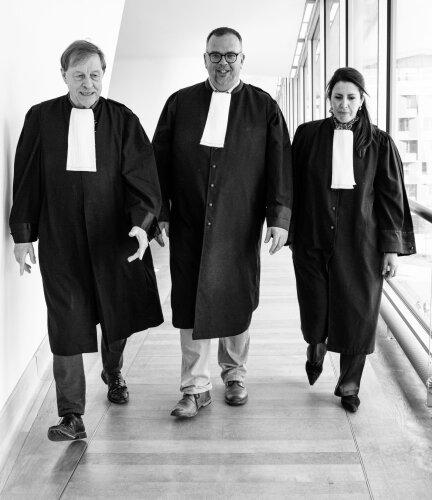Best Renewable & Alternative Energy Lawyers in Belgium
Share your needs with us, get contacted by law firms.
Free. Takes 2 min.
Or refine your search by selecting a city:
List of the best lawyers in Belgium
About Renewable & Alternative Energy Law in Belgium
Belgium has made significant progress in integrating renewable and alternative energy sources into its national energy mix. The country is committed to European Union climate targets, which include reducing greenhouse gas emissions and increasing the share of renewables in energy consumption. Renewable energy in Belgium includes technologies such as wind power, solar power, biomass, and hydroelectricity. The legal landscape around these energy types is dynamic, shaped by both national and EU-level regulations. The federal and regional governments play separate roles in energy policy, with regions (Flanders, Wallonia, and Brussels-Capital) holding considerable autonomy over energy matters.
Why You May Need a Lawyer
Legal assistance is often crucial when dealing with renewable and alternative energy in Belgium. Here are some common situations where a lawyer's help might be needed:
- Securing permits and licenses for renewable energy projects such as solar farms or wind turbines.
- Complying with regional and EU sustainability standards and regulations.
- Negotiating power purchase agreements or energy supply contracts.
- Pursuing government subsidies or incentives for developing or installing renewable energy technologies.
- Resolving disputes between energy producers, grid operators, or local authorities.
- Addressing environmental impact assessments and community consultations.
- Navigating intellectual property rights for new energy technologies.
- Dealing with cross-border projects and related regulatory requirements.
Given the complexity and evolving nature of laws, an experienced energy lawyer can help you protect your interests and ensure full compliance.
Local Laws Overview
Belgium's renewable and alternative energy sector is governed by a mix of federal and regional laws, as energy is largely a regionalized competence. Key aspects of the legal framework include:
- Regional energy plans that set out objectives for renewable energy contributions and emission reductions.
- The issuance of green certificates and guarantees of origin to incentivize renewable production.
- Permitting requirements for installing solar panels, wind turbines, and biomass facilities, which differ in Flanders, Wallonia, and Brussels-Capital.
- EU directives, such as the Renewable Energy Directive and the Energy Efficiency Directive, which must be implemented into Belgian law.
- Support mechanisms such as feed-in tariffs and investment subsidies subject to eligibility and administrative procedures.
- Grid access rules and obligations on transmission and distribution system operators to prioritize renewable sources.
- Regulations related to land use planning, zoning, and environmental protection for project sites.
Staying updated with both regional and federal developments is essential for anyone participating in renewable or alternative energy projects in Belgium.
Frequently Asked Questions
What renewable energy sources are promoted in Belgium?
Belgium promotes wind, solar, biomass, and hydroelectric energy. Each region has its own targets and support schemes.
Do I need a permit to install solar panels at home?
While small household installations typically have straightforward procedures, some regions may require notification or permit depending on the size and type of installation.
What is a green certificate, and how does it work?
Green certificates are tradable documents awarded for producing renewable electricity. They serve as proof that a certain amount of electricity was generated from renewable sources and can be sold or traded on the market.
How do I access government subsidies for renewable energy?
Flemish, Walloon, and Brussels-Capital regions offer specific subsidies and incentives. Procedures and eligibility conditions depend on the type of technology and the intended use.
Can foreign investors participate in Belgian renewable energy projects?
Yes, foreign investors can set up or fund renewable energy projects in Belgium but must comply with local regulatory requirements and may need to form partnerships with local entities.
What role do municipalities play in renewable energy projects?
Municipalities are involved in planning permission, local zoning decisions, and often in the consultation process for larger infrastructure projects.
Are there restrictions on where I can install wind turbines?
Yes, strict rules apply to site selection, noise limits, distance from inhabited areas, and environmental impact. Each region has different requirements.
How are disputes in the renewable energy sector resolved?
Disputes can be settled through negotiation, mediation, or litigation in administrative or civil courts. Specialized lawyers can represent parties in these proceedings.
What obligations do renewable energy producers have regarding grid access?
Producers have the right to connect to the grid, and operators must give priority to renewable sources, within the limits of technical capacity and safety.
What standards must be followed for energy efficiency and sustainability?
Belgian and EU regulations set minimum standards for building efficiency, environmental protection, and technical safety, which must be met by all energy projects.
Additional Resources
If you are seeking more information or practical support, consider consulting the following organizations and governmental bodies:
- Federal Public Service Economy - Energy Division: Responsible for monitoring federal energy policy.
- Vlaamse Energieagentschap (VEA) - Flemish Energy Agency: Handles energy policy, grants, and support in Flanders.
- Service Public de Wallonie - Département de l'Energie: Oversees renewable energy initiatives in Wallonia.
- Brussels Environment - Leefmilieu Brussel: Manages regional support schemes in Brussels-Capital.
- Commission for Electricity and Gas Regulation (CREG): National energy regulator.
- ODE Vlaanderen: Sector organization for renewable energy in Flanders.
- APERe asbl: Belgian association promoting renewable energy.
- European Commission Directorate-General for Energy: EU-level policy and funding opportunities.
Next Steps
If you need legal assistance regarding renewable or alternative energy in Belgium, here are practical steps to follow:
- Clearly identify your needs, such as securing permits, accessing subsidies, or addressing a legal dispute.
- Gather all relevant documentation, including project plans, contracts, permits, and correspondence with authorities.
- Consult specialized legal professionals with experience in Belgian energy and environmental law.
- Reach out to regional agencies or organizations for specific guidance related to your region.
- Stay informed of ongoing legal and policy changes affecting the renewable energy sector.
- Consider alternative dispute resolution options in the event of a legal conflict.
Engaging the right legal support can help you navigate complex regulations, avoid costly mistakes, and ensure your renewable energy project is successful and compliant with all requirements in Belgium.
Lawzana helps you find the best lawyers and law firms in Belgium through a curated and pre-screened list of qualified legal professionals. Our platform offers rankings and detailed profiles of attorneys and law firms, allowing you to compare based on practice areas, including Renewable & Alternative Energy, experience, and client feedback.
Each profile includes a description of the firm's areas of practice, client reviews, team members and partners, year of establishment, spoken languages, office locations, contact information, social media presence, and any published articles or resources. Most firms on our platform speak English and are experienced in both local and international legal matters.
Get a quote from top-rated law firms in Belgium — quickly, securely, and without unnecessary hassle.
Disclaimer:
The information provided on this page is for general informational purposes only and does not constitute legal advice. While we strive to ensure the accuracy and relevance of the content, legal information may change over time, and interpretations of the law can vary. You should always consult with a qualified legal professional for advice specific to your situation.
We disclaim all liability for actions taken or not taken based on the content of this page. If you believe any information is incorrect or outdated, please contact us, and we will review and update it where appropriate.
Browse renewable & alternative energy law firms by city in Belgium
Refine your search by selecting a city.














